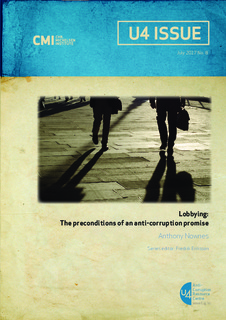Lobbying: the preconditions of an anti-corruption promise
Original version
Bergen: Chr. Michelsen Institute (U4 Issue 2017:8) 28 p.Abstract
Can lobbying be a realistic and legitimate alternative to corruption in less developed countries? This paper addresses this question by: (1) delineating the differences and similarities between lobbying and corruption; (2) discussing the research on lobbying in less developed countries; (3) concluding that at this point we do not have enough information to address this question; and (4) suggesting that more research is required to clarify the relationship between lobbying, corruption and governance regime types. In the end, the answer to the question, “ Can lobbying be a realistic and legitimate alternative to corruption in less developed countries?” is unknown. But a number of intriguing clues suggest that the answer may be “Yes.” But there is much more work to be done. Publication author: Anthony Nownes Series editor: Fredrik Eriksson Main implications that donors should know about by Fredrik Eriksson To citizens in many countries, the words lobbying and corruption are virtually synonymous. It is important to recognise, that while both lobbying and corrupt activities seek to influence government, there are nevertheless clear and obvious distinctions between the two. For example, lobbying is legal, while corruption is not. Moreover, lobbying does not clearly entail any breach of trust, while corruption does. In addition, lobbying seeks to influence government decisions by providing information that may or may not satisfy a certain interest, while corruption seeks to influence government authority through some means that provide a “private gain.” Finally, an important difference is that corruption is, of course, considered bad by anti-corruption advocates, while lobbying to influence policymaking is not viewed as a corrupt or illegitimate activity by itself. Rather, it is often viewed as an important element of government decision-making processes in many developed countries.
